The world will see more changes over the next ten years than it has in the past century. Augmented and virtual reality technologies, wearable devices, brain-computer interfaces, artificial intelligence and the Internet of things will veer everyone’s life upside down.
AUGMENTED REALITY AND WEARABLE DEVICES
Earlier this year Mark Zuckerberg revealed the direction in which he believes IT technologies will move until 2030. Reminding that the 90s of the last century were the era of PCs, followed by the time of smartphones, the head of Facebook declared: the next step forward is a step into augmented and virtual reality, and devices with support for these functions are anticipating the principle development.
Obviously, Zuckerberg sees this future through his rose-colored glasses – his company, which six years ago purchased the developer of virtual reality headsets Oculus, such development for him is simply profitable. Nevertheless, many people concur with such assessments. Thus, according to IDC analysts, by the end of 2023, the market for wearable devices (including those with VR capabilities) will reach 279 million units with an average annual growth rate of 8.9%.
Incidentally, the head of Facebook sees the good in it not only for himself but for the entire humanity: if modern gadgets separate people from each other, replacing live communication with messages, at that point VR will allow us to become closer again, creating a feeling of being close.
BIOHACKING AND NEURAL INTERFACES
Biohackers that embed microchips under their skin have been around for quite a while. The manufacturer of electronic implants Dangerous Things three years ago reported that their sales exceeded 10 thousand chips. RFID and NFC implants of the size of rice grains supplant their owners with bank and smart cards, house and car keys, store passwords, contacts, and addresses of bitcoin wallets. In any case, the technologies of the near future will take the potential of implants to a completely different level.
At the latest Consumer Electronics Show, a startup from France, NextMind, demonstrated a device that reads electrical impulses from the brain, decodes them and theoretically allows to use the power of thought to control any device, from drones to computers. Elon Musk also relies on such solutions: his company Neuralink develops technologies for direct interaction between the human brain and the computer.
It is expected that by the end of the decade we will see serial devices, although their creators must be prepared for ethical problems: opponents of direct “invasion” of the cerebrum proclaim war on these innovations in advance.
#tech #future-trends #artificial-intelligence #augmentedreality #wearables
